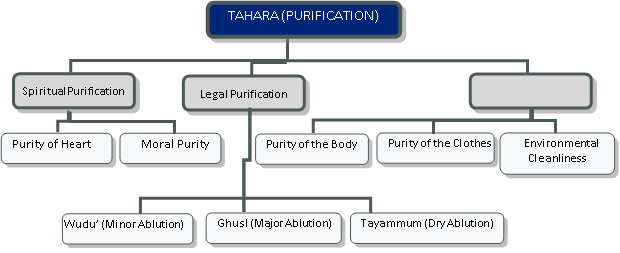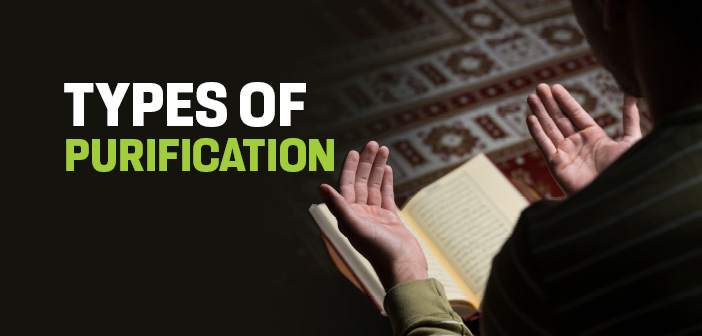What is types of purification?

I. Spiritual Purification
The cleanliness of heart and soul is as important as the cleanliness of the body and clothing. For the purpose of purifying the heart and soul, Islam has ordered avoiding sins and evil, in addition to the actions that are not islamically appropriate.
For deeds to be acceptable and valid by Allah, the first condition is to have strong faith. Faith is a form of spiritual purification, while its opposite i.e. kufr (dis
belief) is spiritual impurity. Nifaq (hypocrisy) and shirk (associating partners with Allah) are also types of spiritual impurities. One who has no faith is doomed to misfortune in this world and likewise eternal damnation in the hereafter. Purifying oneself from evil and placing the belief in Allah in one’s soul is the foremost condition for happiness in this world and the next. Allah says in the Qur’an: “He has succeeded who purifies (his soul) and he has failed who corrupts it.”[1] This verse indicates the importance of spiritual purification in Islam.
There are two forms of spiritual purity:
- Purity of the heart: It means to keep the heart pure from beliefs and perceptions that are against Islam, to have sincere and firm faith and to have pure intentions in the heart.
- Moral Purity: Moral Purity means to avoid bad behavior that is considered not appropriate in Islam. Being good and polite to others, sharing others’ happiness and grief, being righteous and truthful at all times, benefiting from Allah’s bounties in the right manner, avoiding harming other creatures, and abstaining from evil and sins are all part of being pure in terms of morals.
Allah loves the individual with good morals, and on that basis, the people love and respect such an individual. This situation leads to people maintai
ning their status as respected citizens within the society.
II. Physical Purity
- Purity of the body: Cleansing of any impurities or dirt on the body is essential. Cleaning of the hair, nails, brushing teeth and washing hands and mouth before and after meals are all considered steps of purifying the body.
- Purity of the clothes: Keeping the clothing clean is also important in terms of preventing bacteria and diseases from breeding on the fabric and one’s body. Keeping clothing clean is just as important as keeping the body clean.
Wearing clean clothing is a person’s responsibility towards himself and those around him. Thus, one does not wear dirty and untidy clothing. He should be presentable at all times. A person who wears clean and tidy clothing is also regarded a notable person by others.
- Environmental cleanliness: Keeping the environment clean includes hygiene of homes, schools, workplaces, streets, air and the purity of the water.
Cleanliness of the environment is also very crucial for human health; especially the air we breathe and the water we drink must be free of any harmful chemicals and substances.
III. Legal Purity (Both Physical and Spiritual)
The conditions that require the performance of ablution and hinder the performance of certain acts of worship are called hadath. They are regarded as spiritual impurities. Those who need to perform wudu’ (minor ablution) or ghusl (major ablution) are physically clean, however they are considered legally impure. This is why it is not appropriate for them to stand before Allah in such a state of impurity, and they are required to purify themselves before coming to Allah’s presence.
By performing wudu’, limbs that are most frequently used, such as hands, arms, face, feet, and orifices such as mouth and nostrils, are cleansed. Likewise, the whole body is cleansed and purified by means of ghusl, thus ensuring physical purity as well as legal purity (hukmi tahara). The significance of major ablution (ghusl) is obvious in respect to maintaining a healthy skin.
Legal purification is carried out with water. If there is no water available, or if it is not possible to use water, then soil is used (tayammum) for legal purification. A person must be free of physical and spiritual impurities to pursue an orderly life in this world and to reach happiness in the hereafter.
[1] Al-Shams, 91: 9-10.
Source: Fiqh1 (According To The Shafi’i School Of Islamic Law), Erkam Publications





